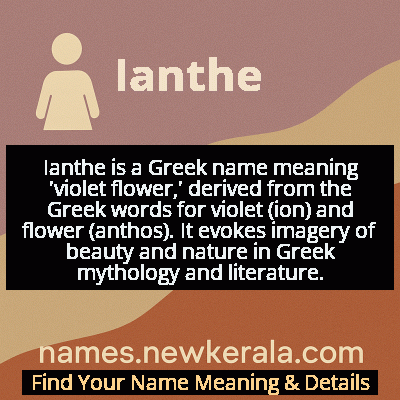Ianthe Name Meaning & Details
Origin, Popularity, Numerology Analysis & Name Meaning of Ianthe
Discover the origin, meaning, and cultural significance of the name IANTHE. Delve into its historical roots and explore the lasting impact it has had on communities and traditions.
Name
Ianthe
Gender
Female
Origin
Greek
Lucky Number
3
Meaning of the Name - Ianthe
Ianthe is a Greek name meaning 'violet flower,' derived from the Greek words for violet (ion) and flower (anthos). It evokes imagery of beauty and nature in Greek mythology and literature.
Ianthe - Complete Numerology Analysis
Your Numerology Number
Based on Pythagorean Numerology System
Ruling Planet
Jupiter
Positive Nature
Optimistic, inspirational, and creative.
Negative Traits
Scattered, exaggerating.
Lucky Colours
Yellow, gold, purple.
Lucky Days
Thursday.
Lucky Stones
Yellow sapphire.
Harmony Numbers
1, 2, 9.
Best Suited Professions
Arts, writing, communication.
What People Like About You
Creativity, optimism.
Famous People Named Ianthe
Ianthe Brautigan
Writer and Editor
Author of memoir about her father Richard Brautigan
Ianthe Exina
Singer
Lead vocalist of Australian band The Jezabels
Lady Ianthe
Literary Character
Character in Benjamin Disraeli's 'The Young Duke'
Ianthe
Mythological Figure
Oceanid nymph in Greek mythology
Name Variations & International Equivalents
Click on blue names to explore their detailed meanings. Gray names with will be available soon.
Cultural & Historical Significance
In Victorian England, flower names became increasingly popular, and Ianthe fit perfectly into this trend while maintaining its classical dignity. The name's association with violets—flowers that symbolized modesty and faithfulness in the Victorian language of flowers—added layers of meaning that appealed to the era's sensibilities. Throughout the 20th and 21st centuries, Ianthe has maintained a presence in literature and popular culture, often chosen for characters who embody ethereal beauty, intelligence, or mystical qualities. Its enduring appeal lies in its perfect balance of classical weight and delicate beauty.
Extended Personality Analysis
People named Ianthe are often characterized by a unique blend of creativity, sensitivity, and quiet strength. Their floral namesake suggests individuals who appreciate beauty in all its forms and possess an innate sense of aesthetics. They tend to be observant and perceptive, noticing details others might miss, much like how one must look closely to appreciate the delicate beauty of violets. Ianthes typically have rich inner lives and may be drawn to artistic pursuits, writing, or other creative expressions where their imaginative capabilities can flourish.
Despite their gentle exterior, those named Ianthe often possess remarkable resilience and determination. Like the violet that can push through concrete to bloom, they demonstrate quiet perseverance in pursuing their goals. They value deep, meaningful relationships over superficial connections and are often loyal friends and partners. Their combination of artistic sensitivity and inner strength makes them both inspiring and dependable. While they may not seek the spotlight, their contributions—whether artistic, intellectual, or emotional—tend to have lasting impact on those fortunate enough to know them well.
Modern Usage & Popularity
In contemporary naming practices, Ianthe occupies a unique position as a classical name that remains refreshingly uncommon. While not appearing in the top 1000 names in most English-speaking countries, it enjoys steady usage among parents seeking distinctive names with literary and mythological credentials. The name sees periodic spikes in popularity when featured in popular media, such as Anne Rice's vampire novels or television adaptations of fantasy series. Ianthe appeals particularly to educated, artistic parents who value both tradition and individuality. Its rarity ensures that bearers won't share their name with multiple classmates, while its classical roots provide a sense of history and substance. The name works well in professional contexts while maintaining its poetic quality, making it an excellent choice for parents who want a name that will serve their child from childhood through adulthood. Current naming trends favoring unique classical names suggest Ianthe may see increased usage in coming years.
Symbolic & Spiritual Meanings
The symbolic meanings of Ianthe are multifaceted and deeply rooted in both its linguistic components and mythological associations. Literally meaning 'violet flower,' the name carries the symbolism of violets across cultures—representing modesty, spiritual wisdom, and faithfulness. In Greek mythology, violets were sacred to Artemis and were believed to have grown where Orpheus laid his lyre, connecting the flower to music and artistic inspiration. The color purple/violet has long symbolized royalty, mystery, and transformation, adding layers of meaning to the name.
As an Oceanid, Ianthe also embodies water symbolism, representing emotion, intuition, and the subconscious. Water's ability to adapt while maintaining its essential nature mirrors the personality traits often associated with Ianthe—flexibility combined with core integrity. The combination of floral and aquatic symbolism creates a name that suggests both delicate beauty and profound depth. In modern symbolic interpretation, Ianthe represents the idea that true strength often lies in gentleness, and that the most meaningful beauty may not be immediately apparent but reveals itself gradually to those who take the time to look closely.

